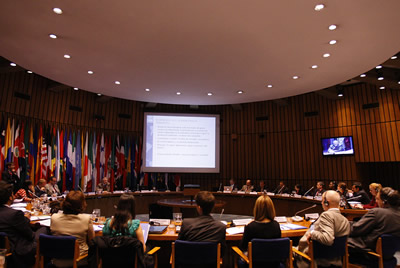Region's Countries Seek Participation of All Citizens in Environmental Issues
Work area(s)
Topic(s)
Representatives from Latin America and the Caribbean will make progress in the application of Principle 10 of the Rio Declaration on Environment and Development.

(6 November 2012) Representatives from the 10 Latin American and Caribbean countries that are signatories to the Declaration on the application of Principle 10 of the Rio Declaration on Environment and Development - which states that environmental issues are best handled with the participation of all concerned citizens - opened a meeting at ECLAC today to agree on new actions to apply this Principle in the region.
At the meeting, which will be held until Wednesday 7 November, government delegates will make progress towards defining a roadmap for the 2012-2014 biennium in matters enshrined in Principle 10, which states that each individual should have appropriate access to information, the opportunity to participate in decision-making processes and effective access to judicial and administrative proceedings.
The meeting was opened by Joseluis Samaniego, Director of the Sustainable Development and Human Settlements Division of ECLAC, which is a United Nations body that serves as technical secretariat for the process of monitoring the application of Principle 10.
According to Mr. Samaniego "Today we are celebrating the search for a regional path for applying Principle 10 of the Rio Declaration on Environment and Development, driven in Rio+20 by the Governments of Chile, Costa Rica, Dominican Republic, Ecuador, Jamaica, Mexico, Panama, Paraguay, Peru and Uruguay. Signatory countries have expressed their will to begin a process to explore the viability of having an instrument open to all the region's countries and with significant participation of all concerned citizens".
He added "In ECLAC, we are convinced that the full implementation of Principle 10 in Latin America and the Caribbean seeks - by means of transparency, justice and access to information - to deepen social cohesion and democracy and eliminate local and global asymmetries".
The opening session of the First meeting of the focal points appointed by the Governments of the signatory countries of the Declaration on the application of Principle 10 of the Rio Declaration on Environment and Development in Latin America and the Caribbean was also attended by Fernando Schmidt, Chilean Undersecretary for Foreign Affairs, who reiterated that that environmental issues are best handled with the participation of all citizens.
Mr. Schmidt went on to say that "As governments, we face a huge challenge: to generate spaces for our societies to be able to participate in an active and organized way in building a common future".
Ricardo Irarrázabal, Chilean Undersecretary for the Environment, stated that the topic is truly essential for democracy and the development of the environment: "We cannot ignore the obligation to strengthen our democracies and improve the quality of life of future generations".
Undersecretary Irarrázabal emphasized the fact that Latin America and the Caribbean is not starting from scratch in this regard, as it has 20 years of experience in overcoming major barriers and gaps: "We must boost the capacities of our governments and citizens, so as to increase the chances of effectively implementing rights of access".
Andrea Sanhueza, from the Access Initiative in Latin America and the Caribbean, spoke on behalf of a global network of civil society organizations. She affirmed that Principle 10 strengthens democracy and makes sustainable development viable.
Ms. Sanhueza declared "As civil society organizations, we believe that Latin America is prepared to move towards a binding regional agreement enshrining the rights of access to information, participation and justice listed in Principle 10".
At the end of the ECLAC meeting, representatives from the signatory countries are expected approve a roadmap for creating an instrument for the application of Principle 10 in Latin America and the Caribbean.
Any queries should be sent to the ECLAC Public Information and Web Services Section.
E-mail: prensa@cepal.org, Telephone: (56 2) 210 2040.
Follow us on: Twitter, Facebook, Flickr and YouTube.
Related content

Countries Approve Road Map for Regional Instrument on Access to Environmental Information, Participation and Justice
Latin American and Caribbean nations agree to strengthen regional cooperation and dialogue on environmental matters.
Country(ies)
- Latin America and the Caribbean
-
Chile
-
Costa Rica
-
Ecuador
-
Jamaica
-
Mexico
-
Panama
-
Paraguay
Contact
Public Information Unit
- prensa@cepal.org
- (56 2) 2210 2040